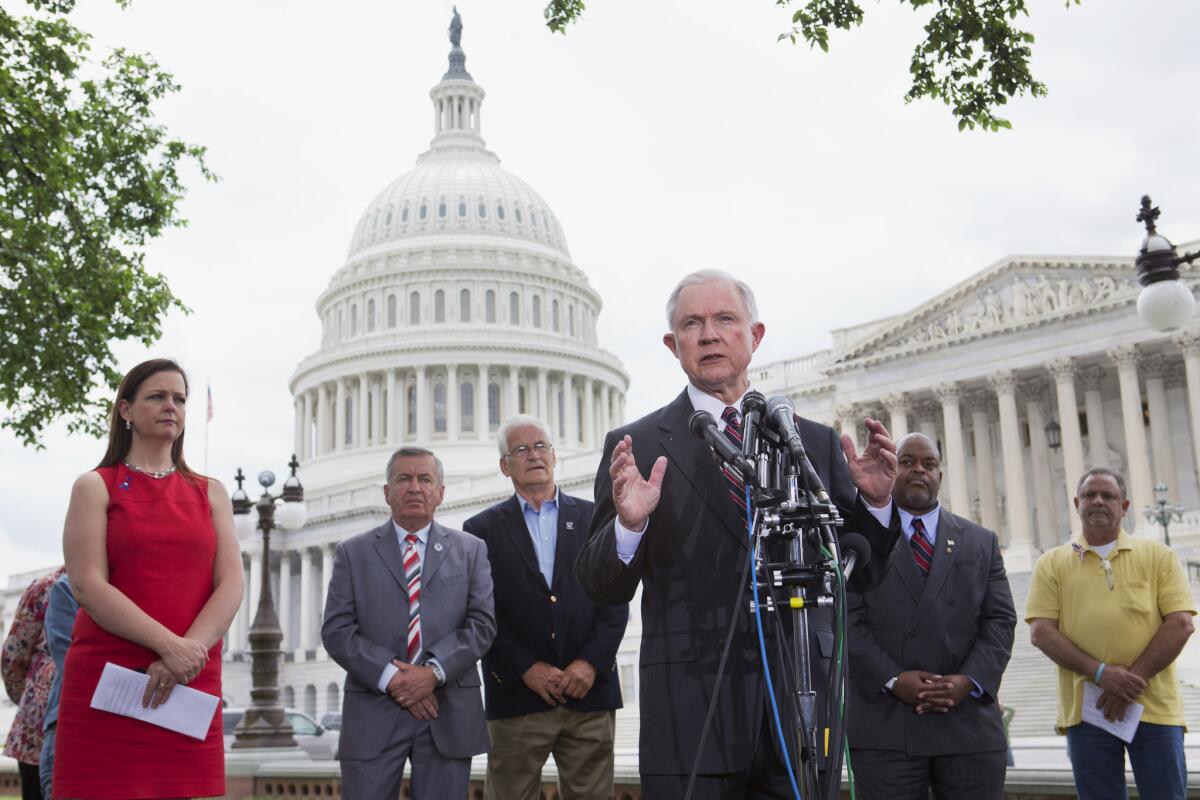McManus: The GOP’s immigration blues

For a moment there, immigration reform almost looked easy.
Republicans, reeling from the defeat of Mitt Romney, realized that they needed to convince Latino voters that the GOP didn’t want to deport their grandmothers. In the Senate, a bipartisan “Gang of Eight” wrote a bill that combined tougher border enforcement with a long but clear path to citizenship for illegal immigrants. The bill’s chief sponsor, the ruthlessly pragmatic Sen. Charles E. Schumer (D-N.Y.), fought off liberal amendments and embraced conservative changes to attract more Republican support. As the bill headed for passage with an impressive 70 votes (or even more), surely the GOP-led House would bend to the people’s will — right?
Not so fast. The Senate bill appears certain to pass, but then comes the House, where Republicans are far more conservative — and less worried about Latino voters. House members aren’t convinced that the American public — their public, at least — wants a bill giving illegal immigrants a path to citizenship.
U.S. IMMIGRATION LAW: Decades of debate
Almost two-thirds of the 234 House Republicans represent districts where Latinos make up fewer than 10% of the population. Because of the magic of congressional districting, the House GOP disproportionately represents voters who are rural, white and working class — the people most likely to oppose citizenship for illegal immigrants.
For many of those House members, endorsing citizenship for illegal immigrants wouldn’t just be an ideological stretch; it could put them in danger of facing a challenge from the right in the next Republican primary.
Enter the tea party. Until this month, grass-roots conservative organizations weren’t all that focused on immigration reform. They had their hands full with Benghazi, the Internal Revenue Service and other Obama administration quasi-scandals. But the immigration bill’s noisy progress to the Senate floor (plus a shortage of any new scandals) has changed that.
SLIDE SHOW: Five most important immigration reform issues
In recent days, conservatives like Jenny Beth Martin, national coordinator of the Tea Party Patriots, have gone on the attack. The Senate measure is “like Obamacare,” Martin said Tuesday. “This bill is too massive, offers special-interest kickbacks and perks, has no measurable or enforceable border security, [and] no one has had time to read what’s in it.”
She and other tea party leaders have promised to organize hometown opposition to the Senate bill as the issue moves into the House, and warn that they may even try to mount primary challenges to Republican legislators who support the measure.
And the tea partiers have a new champion: Sen. Ted Cruz (R-Texas), a conservative who was elected only last year but jumped immediately into the spotlight on the immigration issue.
“The more the American people understand [the Senate bill], the more they will be opposed,” Cruz told anti-immigration activists on a conference call Monday. “The only thing that has the potential to stop that are the grass roots in America rising up and saying no.”
Sarah Palin has jumped into the fray too. “As the Senate moves to pass amnesty, the only bright spot in this travesty is the rallying revolution we can look forward to,” she said in a posting on her Facebook page Monday. “Just as opposition to Obamacare became a rallying cry for the 2010 midterm elections, opposition to this fundamentally transforming amnesty bill will galvanize the grass roots in next year’s elections.”
Palin, Cruz and other opponents of the Senate bill are being careful to frame their opposition in immigrant-friendly terms. They’re not opposed to immigration, they insist; they’re merely opposed to “amnesty” for people who broke the law to enter the United States.
But that doesn’t soften the division within Republican ranks. Palin denounced Sen. Marco Rubio (R-Fla.) by name as an “amnesty supporter,” and Cruz criticized Republicans who voted for a GOP-sponsored amendment on border security as looking for “a fig leaf.”
That measure of internecine bitterness has heightened the dilemma for Rep. John A. Boehner (R-Ohio), the speaker of the House, who has the unenviable job of presiding over the next phase in the debate: finding something the House can pass.
Boehner has already promised to bring forward only measures that can win a majority of the 234 Republican votes in the House — a pledge that, if he sticks to it, rules out a comprehensive bill that could attract many Democratic votes. Instead, Boehner is likely to take the easy way out and try to pass a series of piecemeal measures beginning with border security and work visas, leaving the debate over a path to citizenship until last — or maybe never.
Even if the House passes an immigration bill next month, it will then need to cut a deal with the Senate in a conference, probably in the fall.
And that leads to one more potential obstacle: Those tea party groups are promising to organize rallies and show up at town meetings with members of Congress in August, just as they did when Obamacare was being debated in 2009 and 2010. Only this time, instead of shouting mostly at Democrats, they’ll be shouting mostly at Republicans.
The outcome could well be a House-Senate stalemate, and that won’t be good for the GOP. Latino voters, at least, will be more likely to give Democrats credit for trying to pass a law — and to blame Republicans for standing in the way.
If that happens, Republican House members will have safer seats in 2014, but their party will be worse off in the presidential election of 2016. And, in a sense, they will have made a choice that isn’t conservative at all: short-term gain but long-term pain.
Follow Doyle McManus on Twitter @DoyleMcManus
More to Read
A cure for the common opinion
Get thought-provoking perspectives with our weekly newsletter.
You may occasionally receive promotional content from the Los Angeles Times.






